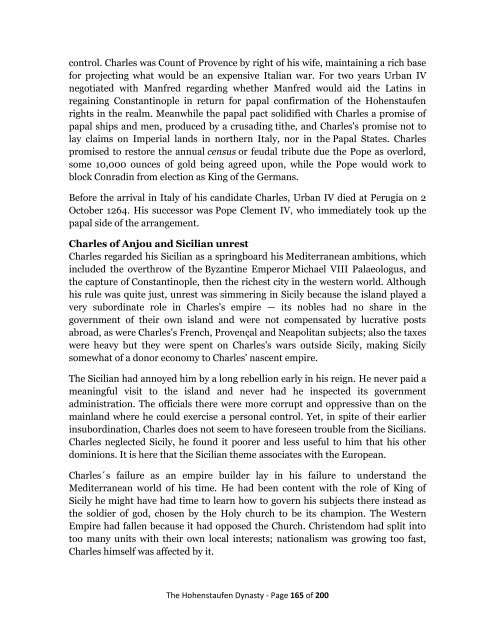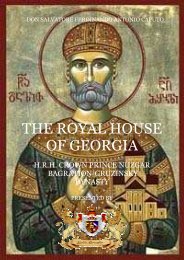here - Nobility Associations
here - Nobility Associations
here - Nobility Associations
Create successful ePaper yourself
Turn your PDF publications into a flip-book with our unique Google optimized e-Paper software.
control. Charles was Count of Provence by right of his wife, maintaining a rich base<br />
for projecting what would be an expensive Italian war. For two years Urban IV<br />
negotiated with Manfred regarding whether Manfred would aid the Latins in<br />
regaining Constantinople in return for papal confirmation of the Hohenstaufen<br />
rights in the realm. Meanwhile the papal pact solidified with Charles a promise of<br />
papal ships and men, produced by a crusading tithe, and Charles's promise not to<br />
lay claims on Imperial lands in northern Italy, nor in the Papal States. Charles<br />
promised to restore the annual census or feudal tribute due the Pope as overlord,<br />
some 10,000 ounces of gold being agreed upon, while the Pope would work to<br />
block Conradin from election as King of the Germans.<br />
Before the arrival in Italy of his candidate Charles, Urban IV died at Perugia on 2<br />
October 1264. His successor was Pope Clement IV, who immediately took up the<br />
papal side of the arrangement.<br />
Charles of Anjou and Sicilian unrest<br />
Charles regarded his Sicilian as a springboard his Mediterranean ambitions, which<br />
included the overthrow of the Byzantine Emperor Michael VIII Palaeologus, and<br />
the capture of Constantinople, then the richest city in the western world. Although<br />
his rule was quite just, unrest was simmering in Sicily because the island played a<br />
very subordinate role in Charles's empire — its nobles had no share in the<br />
government of their own island and were not compensated by lucrative posts<br />
abroad, as were Charles's French, Provençal and Neapolitan subjects; also the taxes<br />
were heavy but they were spent on Charles's wars outside Sicily, making Sicily<br />
somewhat of a donor economy to Charles' nascent empire.<br />
The Sicilian had annoyed him by a long rebellion early in his reign. He never paid a<br />
meaningful visit to the island and never had he inspected its government<br />
administration. The officials t<strong>here</strong> were more corrupt and oppressive than on the<br />
mainland w<strong>here</strong> he could exercise a personal control. Yet, in spite of their earlier<br />
insubordination, Charles does not seem to have foreseen trouble from the Sicilians.<br />
Charles neglected Sicily, he found it poorer and less useful to him that his other<br />
dominions. It is <strong>here</strong> that the Sicilian theme associates with the European.<br />
Charles´s failure as an empire builder lay in his failure to understand the<br />
Mediterranean world of his time. He had been content with the role of King of<br />
Sicily he might have had time to learn how to govern his subjects t<strong>here</strong> instead as<br />
the soldier of god, chosen by the Holy church to be its champion. The Western<br />
Empire had fallen because it had opposed the Church. Christendom had split into<br />
too many units with their own local interests; nationalism was growing too fast,<br />
Charles himself was affected by it.<br />
The Hohenstaufen Dynasty - Page 165 of 200



